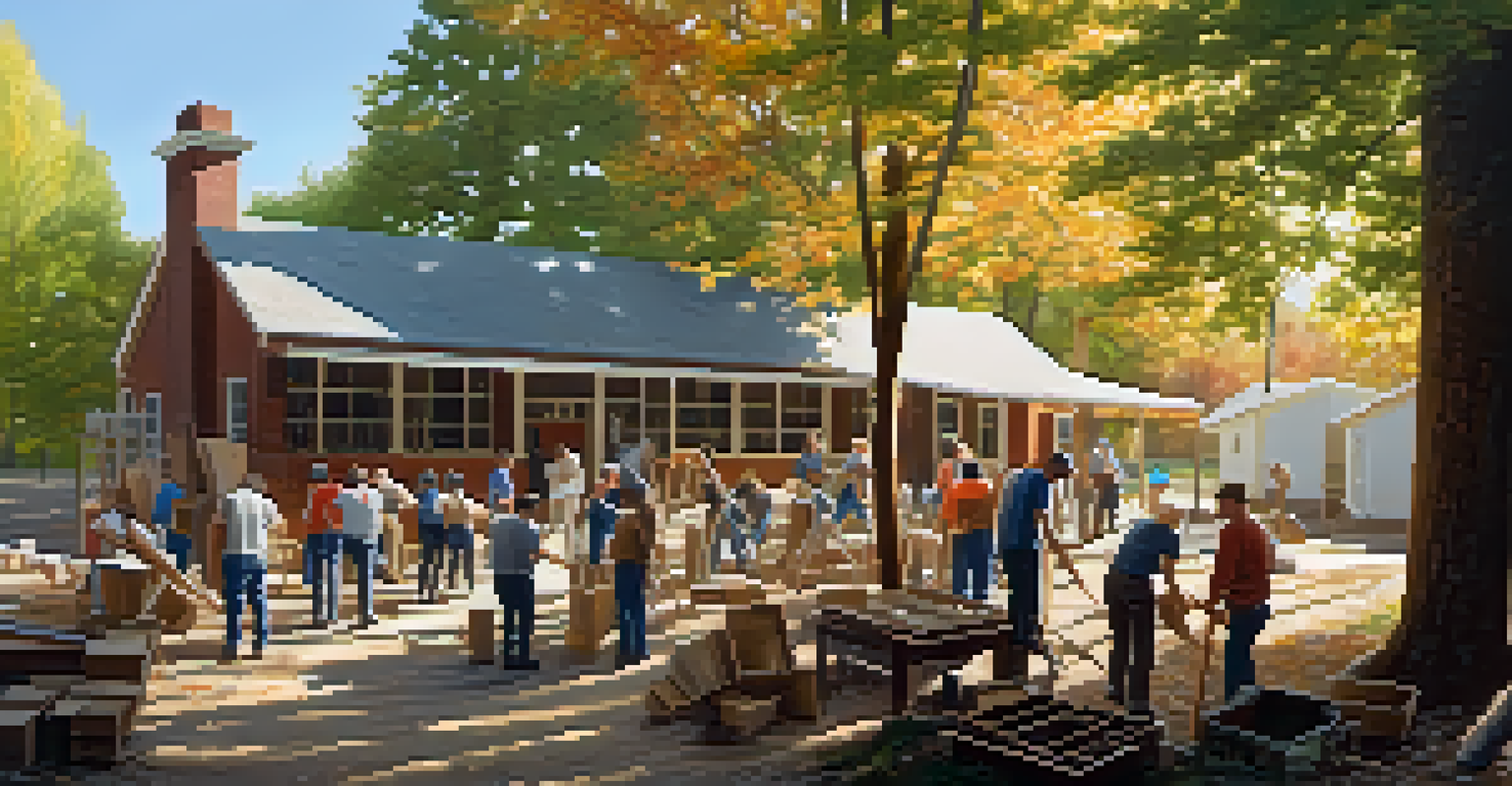The Role of Arizona's Historic Preservation Advocacy Groups

Understanding Historic Preservation in Arizona
Historic preservation in Arizona involves protecting buildings, sites, and neighborhoods that hold cultural or historical significance. This practice is essential for maintaining the state's rich heritage, which reflects the diverse influences from Native American, Spanish, and American cultures. By safeguarding these landmarks, preservationists help ensure that future generations can appreciate and learn from Arizona's unique history.
Preservation is a form of empowerment, allowing communities to connect with their histories and define their identities.
The state is home to numerous historic sites, from ancient pueblos to 20th-century architecture, each telling a part of Arizona's story. Preservation efforts not only focus on physical structures but also on the cultural narratives they embody. This multifaceted approach allows communities to connect with their past while fostering a sense of identity and pride.
Advocacy groups play a critical role in this process, working tirelessly to raise awareness and support for preservation initiatives. They bridge the gap between local residents, government entities, and historical organizations, creating a collaborative environment for preserving Arizona's treasures.
Key Advocacy Groups and Their Mission
Arizona boasts several dedicated historic preservation advocacy groups, each with a unique mission. Organizations like the Arizona Preservation Foundation focus on educating the public about preservation issues while providing resources for those interested in their own historic properties. Their initiatives include workshops, grants, and community events that encourage involvement in local preservation efforts.

Another prominent organization is the Arizona State Historic Preservation Office (SHPO), which collaborates with local agencies and non-profits. SHPO's mission is to promote the preservation of Arizona’s historic resources through planning, education, and community engagement. Their efforts ensure that preservation is not just a niche interest but a widespread community value.
Preservation Protects Arizona's Heritage
Historic preservation in Arizona safeguards culturally significant sites, ensuring future generations can appreciate the state's diverse history.
These groups also strive to influence policy by advocating for legislation that supports preservation at the state and local levels. By rallying community support and raising awareness, they create a stronger voice for the importance of preserving Arizona's heritage.
Community Engagement and Education Initiatives
Community engagement is a cornerstone of historic preservation advocacy in Arizona. Many groups actively involve local residents in hands-on preservation projects, fostering a sense of ownership and pride in their historical sites. For instance, volunteer programs often enlist community members to help restore or maintain local landmarks, turning preservation into a shared responsibility.
Our heritage is our legacy. If we do not protect it, we lose a part of ourselves.
Education initiatives play a significant role in these efforts as well. Advocacy groups frequently host workshops, lectures, and tours to inform the public about the importance of preservation. These programs not only educate attendees about the historical significance of various sites but also inspire them to become advocates for their own communities.
By empowering residents with knowledge and involvement, these groups cultivate a culture of preservation that can lead to long-lasting change. As more people become aware of their local heritage, they are more likely to support preservation efforts and advocate for responsible planning and development.
Challenges Facing Historic Preservation
Despite their best efforts, historic preservation advocacy groups in Arizona face several challenges. One significant issue is funding; many organizations rely on donations and grants to operate, which can be inconsistent. This financial instability can hinder their ability to undertake large-scale projects or initiatives that would otherwise benefit the community.
Another challenge is the growing pressure from development, as urban expansion often threatens historic sites. As cities grow, there can be a tendency to prioritize new construction over preserving older buildings. Advocacy groups must find ways to balance development needs with the preservation of historical integrity, which can be a delicate negotiation.
Community Involvement is Key
Local residents play a vital role in preservation efforts, fostering ownership and pride through active participation in restoration and education initiatives.
Additionally, raising awareness about the importance of preservation can be difficult in a fast-paced, modern society. While many people appreciate historical sites, they may not understand the implications of losing them. Advocacy groups must continue to educate the public and advocate for policies that recognize the value of preserving Arizona's unique heritage.
Successful Preservation Projects in Arizona
Arizona has witnessed numerous successful preservation projects that showcase the impact of advocacy groups. One notable example is the restoration of the historic Hotel San Carlos in Phoenix. Once in disrepair, the hotel now stands as a beautifully preserved landmark that attracts visitors and locals alike, thanks in part to the efforts of preservation advocates.
Another success story is the revitalization of the Route 66 corridor, which has seen many historic motels and diners restored to their former glory. Advocacy groups have worked diligently to promote the historic significance of Route 66, encouraging both tourism and local engagement with these sites. This has helped revitalize communities along the route, enhancing their economic vitality.
These examples highlight the tangible benefits of preservation efforts, not just for maintaining history but also for boosting local economies and community pride. When historic sites are preserved, they often become focal points for tourism and community events, proving that advocacy efforts can lead to positive outcomes.
The Future of Historic Preservation in Arizona
Looking ahead, the future of historic preservation in Arizona hinges on continued advocacy and community involvement. As more people recognize the value of their local history, there is potential for increased support for preservation initiatives. This growing awareness can lead to more robust funding opportunities and a stronger collective voice in advocating for policies that protect historic resources.
Technology also plays a role in shaping the future of preservation. Digital tools and platforms can help advocacy groups reach wider audiences, engage younger generations, and share the stories behind historic sites more effectively. By utilizing social media, interactive maps, and virtual tours, these organizations can inspire a new wave of preservationists.
Challenges Threaten Preservation Efforts
Funding issues and development pressures pose significant challenges to historic preservation advocacy groups, necessitating ongoing public awareness and support.
Ultimately, the success of historic preservation in Arizona will depend on collaboration between advocacy groups, local governments, and community members. By fostering partnerships and shared objectives, Arizona can ensure that its rich heritage is preserved for generations to come.
How to Get Involved in Preservation Efforts
Getting involved in historic preservation efforts in Arizona is easier than you might think. Many advocacy groups welcome volunteers for various projects, from restoration work to organizing community events. This hands-on approach not only helps preserve local history but also allows participants to learn more about their community's heritage.
Additionally, individuals can support preservation through membership in advocacy organizations. Membership often comes with benefits such as newsletters, access to exclusive events, and the chance to connect with like-minded individuals who share a passion for history. This network can be invaluable for those looking to deepen their involvement and understanding of preservation efforts.

Lastly, advocating for preservation at the local level is essential. Whether it’s attending town meetings, writing letters to local officials, or simply spreading the word about the importance of preserving historical sites, every action counts. By raising awareness and voicing support for preservation initiatives, individuals can play a vital role in ensuring that Arizona's history endures.